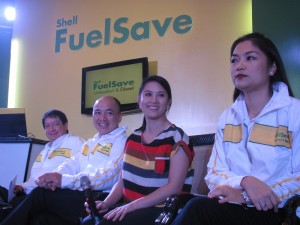Drive smoothly, save on fuel—Shell study

Shell executives Jimmy Diago (far left), Rona Rodriguez-Baes (far right) and other members of the Shell Philippines team reveal the results of the annual Shell FuelSave Index Study and share the best fuel-saving habits.
MANILA, Philippines—Fuel economy is in the hands of the driver.
Shell Philippines shared the best ways to save gasoline based on their latest Shell FuelSave Index study conducted in selected European and Asian countries involving around 8,000 motorists.
From the results, they found it was a person’s driving habits that can best save on the amount of gasoline a car would consume, an increasingly important factor amid high fuel prices.
“Majority of Pinoys are very conscious and it really showed in the research survey. The desire to save fuel is clear and the primary way for drivers to do this is through changing your driving habits,” Rona Rodriguez-Baes, Shell FuelSave brand manager, said during the unveiling of the results of their study.
According to the Shell study, the best way to save on fuel is to drive smoothly by avoiding fast acceleration and hard braking.
“Aggressive driving can use as much as a third more fuel than smooth driving. Avoid accelerating or braking too hard and try to keep your steering as smooth as possible,” the study said.
Jimmy Diago, Shell’s fuel product quality excellence manager, said that aggressive driving “is characterized by rapid acceleration, over-speeding, over-revving and sudden braking.”
“Aggressive driving really wastes fuel and causes your fuel efficiency to deteriorate,” he said. “There’s a huge difference in fuel efficiency [between aggressive and smooth] driving.”
Rapid acceleration consumes more fuel because a greater amount of force is being used to move a car from a full stop compared with a slow acceleration that uses less force to move a car slowly and gradually, Diago said.
He also explained that hard braking, like when stopping at the last minute at an intersection, wastes more fuel than letting the car coast and slow down at least 100 meters away from the intersection before lightly stepping on the brakes.
The study also concluded that using higher gears and avoiding over-revving the engine greatly increases fuel efficiency.
“The higher gear you drive in, the lower your engine speed; change up a gear whenever you can, without making the engine work too hard. Change gear in good time when you pull away or when you’re accelerating. Never ‘redline’ the rev counter,” the study said.
The study said that 79 percent of motorists in the Philippines practice this fuel-saving habit, exceeding the Asian average of 56 percent.
Driving at excessively high speeds was bad for fuel economy since there will be more wind resistance on the vehicle forcing it to consume more fuel to maintain speed.
At least 56 percent of motorists in the Philippines practiced this habit, 16 percent higher than the Asian average, the Shell study said.
Avoiding excessive idling was a very important habit since idling uses fuel but gets the car nowhere. Motorists should also learn the habit of planning trips to accomplish numerous tasks in one travel, helping to save fuel. It was also good to avoid traveling during rush hour since less time stuck in traffic translates to less fuel consumed.
Shell said that “awareness in fuel consumption reduction methods have increased over the years. In 2010, the leading reason that prevents Filipinos from reducing fuel consumption was that they did not know how, with 41 percent.”
“This year, this reason is down to number four with only 12 percent of the respondents,” Shell added.
The study was conducted in United Kingdom, Netherlands, Denmark, Czech Republic, Turkey, Thailand, Singapore, Hong Kong, Malaysia and the Philippines, with up to 1,000 participating in the country.














